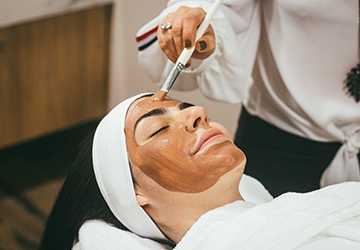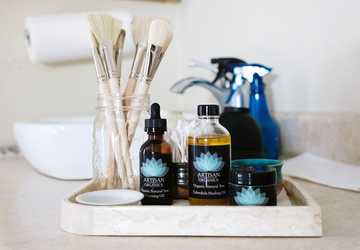beauty
Regarding skincare, the beauty industry is constantly evolving, and one of the most fascinating and promising areas is the study of the skin microbiome. You may have heard the term "microbiome" used in connection with gut health, but did you know that your skin also has a unique microbial ecosystem?
Understanding your skin's microbiome is the latest advancement in beauty science and the key to healthier, more radiant skin. Let's take a deeper look at the skin microbiome to learn what they are, why they're essential, and how you can use this knowledge to better care of your skin.

The Microbiome: Skin's Hidden Support System
Before we delve into the details of the skin microbiome, let's first clarify what the microbiome is. Simply put, the microbiome is the community of microorganisms that live in and around you, including bacteria, viruses, and fungi. These tiny residents play a vital role in maintaining your health and well-being.
Just like your gut has a diverse microbiome that supports digestive and immune function, your skin also has a microbiome that acts as a protective barrier against external threats. Your skin's microbiome is made up of trillions of microbes, forming a complex ecosystem that affects the health and appearance of your skin.
Skin Microbiome: Dynamic Balance
Your skin's microbiome doesn't stand still; it's constantly changing, responding to changes in your environment, diet, and skin care habits. This dynamic balance of microorganisms is critical to skin health. When this balance is disrupted, it can lead to a range of skin problems, including acne, dryness, sensitivity, and even premature ageing.
What exactly do these microorganisms do? They have several essential functions:
Protective barrier: It acts as a protective shield, preventing harmful pathogens from penetrating the skin. It's essentially the skin's first line of defence.
Moisture regulation: Some microorganisms can regulate the skin's moisture content, keeping it hydrated and preventing dryness.
Immune System Support: A balanced microbiome can enhance the skin's immune response, fight infection more effectively and promote faster healing.
Anti-inflammatory effects: Certain microorganisms in the microbiome have anti-inflammatory properties that can reduce skin redness and irritation.
Collagen production: In addition, some microorganisms contribute to the production of collagen, an essential protein that keeps skin elastic and youthful.
The impact of modern life on the skin microbiome
In today's fast-paced world, our skin is constantly exposed to stressors that can disrupt the delicate balance of the skin microbiome. These stressors cover all aspects of modern life:
Harsh cleansers: Overusing harsh cleansers can damage your skin's microbiome by killing beneficial microorganisms, leaving your skin prone to imbalances.
Antibiotics: Whether taken orally or applied topically, antibiotics disrupt the skin's microbiome by targeting harmful and beneficial bacteria indiscriminately, potentially tipping the balance.
Environmental factors: Pollution, UV radiation, and other environmental stressors can negatively impact the skin's microbiome, potentially reducing its functionality.
Diet and Lifestyle: Your eating habits, stress levels, and sleep habits all play a crucial role in influencing the state of your skin microbiome. For example, a diet high in sugar and processed foods can promote the proliferation of harmful bacteria and further complicate the balance of the microbiome.
Skin care products: Be aware that some products may contain ingredients that disrupt the delicate balance of your skin's microbiome. Therefore, it is essential to choose products specifically tailored to the microbiome to ensure they are microbiome-friendly.

How to Understand Your Skin's Microbiome
Now that we know how important a balanced skin microbiome is, you may wonder how we can better understand and care for it. Here are some steps you can take:
Know your skin type: Knowing your skin type is the first step in tailoring your skincare routine to your needs. Is your skin oily, dry, sensitive or a combination? Knowing this will help you choose the right product.
Gentle cleansing: Choose a soft, non-stripping cleanser that won't disrupt your skin's microbiome. Avoid scrubbing vigorously, as this can damage the skin barrier.
Probiotic Skin Care: Consider incorporating probiotic skincare products into your routine. These products contain beneficial bacteria that support your skin's microbiome.
Prebiotics: Prebiotics are ingredients that nourish the good bacteria on your skin. Look for products that contain prebiotics like inulin or chicory root extract.
Avoid overuse of antibiotics: If you take antibiotics for skin problems, use them as directed and discuss their potential. Talk to your dermatologist about the impact antibiotics have on your skin microbiome.
Nutrition and Hydration: A healthy diet rich in fruits, vegetables, and probiotic foods can have a positive impact on your skin's microbiome. Also, stay well hydrated to keep your skin hydrated.
Protect against the elements: Use sunscreen daily to protect your skin from UV damage and pollution. This helps maintain a balanced microbiome.
Consult a dermatologist: If you have ongoing skin concerns or are unsure about your skincare routine, consult a dermatologist. They can assess your skin's microbiome and recommend a personalized solution.
The future of skin care: microbe-friendly products
As our understanding of the skin microbiome continues to improve, we expect an increase in microbiome-friendly skin care products. These products are designed to promote a balanced microbiome and enhance skin health. They may contain ingredients like hyaluronic acid, ceramides, and niacinamide, which support the skin barrier and promote a healthy microbiome.
Additionally, advances in biotechnology are paving the way for personalized skincare based on an individual's unique microbiome. Imagine a future where you can get customized skin care tailored to your skin's needs and microbiome composition.
Conclusion: The beauty of balance
In beauty science, understanding the skin's microbiome is crucial. It's not about getting rid of all the bacteria on your skin; this is to promote a harmonious ecosystem and healthy, radiant skin.
By following the tips above and staying current on the latest developments in skin care science, you can begin your journey toward a more balanced and radiant complexion. Remember, your skin is a living organ with an invisible support system - your microbiome. Treat it with care, and it will reward you with beauty and vitality.
06/17/2024




